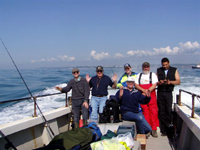SEA anglers are going abroad because there are not enough fish for them at home worth catching.
Last year 217,000, or 15 per cent of them, were drawn by the promise of better fishing, mainly in the Channel Islands,
The figures are in new research* just released into the economic contribution of recreational sea angling in
Published by the Department of the Environment, Food and Rural Affairs (Defra) with the active encouragement and help of the National Federation of Sea Anglers (NFSA), the study estimates there are 1.45 million men, women and children sea anglers in 1 million households.
The total value of their activities is put at up to £1.3 billion a year.
They are fairly evenly spread across the social spectrum. However, their catches were disappointing, 71 per cent saying they caught less fish in the last five years and 62 per cent reporting the fish that were caught were smaller.
“Our efforts to make the government stop overfishing so that fish can recover will benefit every sea angler and coastal community,” said Ted Tuckerman, chairman of the NFSA.
“The potential socio-economic benefits of sea angling are enormous. Ministers, MPs and civil servants are now recognising this but few have yet dared to take steps to do anything really tangible about protecting stocks”
Malcolm Gilbert, the NFSA fisheries representative, said: “While politicians dither huge numbers of immature fish die in trawls and in the hundreds of miles of almost invisible gill nets laid around our coasts which also trap and destroy sea birds, dolphins and porpoises.”
“In other countries where stocks have been restored, recreational angling grew by as much as 35 per cent a year,” said Mr. Gilbert. “Here government want more people to take part in sport. With innovative management objectives, our marine fisheries would draw many more into sea angling and it could be a £2 billion sporting industry within a few years.”
The Environment Agency told the researchers that while sea angling contributed to the overall fishing mortality, with the increasing observance of the NFSA’s catch and release policy “this small level of mortality is now decreasing.”
Commenting on the report the fisheries minister Ben Bradshaw, said sea anglers made a significant contribution to the economy and would be fully involved in fisheries management.
* The report by Drew Associates is available on-line at
http://statistics.defra.gov.uk/esg/reports/Sea Angling/default.asp






